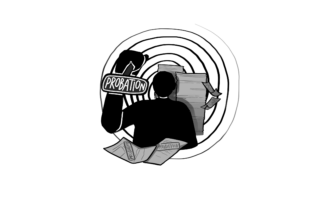On block days, students with a free period in the middle of the day are required to stay at school. Like all study hall students, they are expected to spend the time in the library. On block day periods, such a requirement largely resembles a detention.
During the school day, the Aragon administration is responsible for the safety of all students. In order to fulfill this responsibility, the administration feels it necessary to monitor students from the time they arrive at school to the time they get home. This sentiment manifests itself in Aragon’s official “closed-campus” policy, wherein students are required to stay on campus all day.
While the Aragon administration is right to prioritize students’ safety, the new schedule renders the closed-campus policy out of date. An hour and a half is too long to ask a student to stay in the library. Mature students—upperclassmen, that is—should be given the privilege to leave campus during study hall block periods. In other words, Aragon should become a partially open campus on Wednesday and Thursday block days.
Students are currently expected to stay in study hall on block days because the administration believes study hall encourages productivity, and ensures students’ safety.
Unfortunately, the library is not an environment that fosters productivity. Despite the librarians’ best intentions, the library can be a loud and difficult place to study, and oftentimes study hall students are left without computer access, such as when a visiting class is working on a research project or online presentation.
Allowing responsible students to go home during study hall would allow them to use their block periods in a more efficient manner. Students who need to write essays or work on projects would be able to do so in solitary space, with familiar computers and materials. Students who participate in after-school activities can get a head-start on their homework and save valuable time.
Obviously, there is no way to guarantee that students will be productive if they are allowed to leave campus. But there is similarly no way to guarantee that they will be productive if they stay in the library. Upperclassmen can be trusted to ration their time as they please. If an overworked junior or senior wants to spend their block period relaxing at home, it should be his or her prerogative.
While student safety is perhaps a more valid concern than student productivity, responsible upperclassmen can be expected to accept liability for themselves while off-campus. And in terms of legal responsibility, a system can easily be put in place to release the school of accountability for a student’s safety while he or she is off campus.
In fact, such a system already exists: students who have study hall sixth period have the opportunity to leave school early on Thursdays, as sixth period is the last period of the day on Thursday block. Before being allowed to leave sixth period, students must obtain an off-campus pass from the attendance office and have it signed by Vice Principal Jim Coe. To attain such a pass, students must procure a note with their parent or guardian’s signature, wherein the parent or guardian indicates that the student is free to leave campus during the said time, and that the parent or guardian accepts responsibility for anything that happens to their student while he or she is off-campus.
Such a system could easily be put in place for students wishing to leave school during study hall periods that are not their last period. Parents or guardians would sign a form releasing the school of all liability if anything should happen to their student during the period they are off campus. Once off campus, parents and the student would be responsible for the student’s safety.
It is important to remember that an off-campus privilege would be exactly that: a privilege. Abuse of the freedom, including transporting other students who do not have off campus passes, or habitually returning to school late would result in the confiscation of one’s off-campus pass, and, in more severe cases, disciplinary action.
However, the majority of upperclassmen can be trusted with an hour and half of free time outside of school. Juniors and seniors can find better things to do with the time block periods other than sit in the library; they should be have the freedom to do so.



